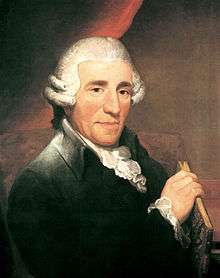L'anima del filosofo
| L'anima del filosofo | |
|---|---|
| Opera by Joseph Haydn | |
 Portrait of the composer by Thomas Hardy, in 1791, when Haydn composed the work, his last opera | |
| Translation | The Soul of the Philosopher |
| Other title | Orfeo ed Euridice |
| Language | Italian |
| Based on | myth of Orpheus |
| Premiere |
9 June 1951 Teatro della Pergola, Florence |
L'anima del filosofo, ossia Orfeo ed Euridice (The Soul of the Philosopher, or Orpheus and Euridice), Hob. 28/13, is an opera in Italian in four acts by Joseph Haydn, the last he ever wrote. The libretto, by Carlo Francesco Badini, is based on the myth of Orpheus and Euridice as told in Ovid's Metamorphoses. Composed in 1791, the opera was never performed during Haydn's lifetime.
After his patron Prince Nikolaus Esterházy had died in 1790, Haydn travelled to London where he received a commission to write several symphonies. The impresario John Gallini also offered him a contract to write an opera for the King's Theatre but due to a dispute between King George III and the Prince of Wales he was refused permission to stage it. As a result, the score was never completed and some music appears to be missing.
Performance history
L'anima del filosofo remained unperformed until 9 June 1951, when it appeared at the Teatro della Pergola, Florence, with a cast including Maria Callas and Boris Christoff, under the conductor Erich Kleiber.
The UK premiere was in 1955, a concert performance at the St Pancras Festival. This was the debut of the baritone Derek Hammond-Stroud.[1]
It has been performed and recorded several times since then.
The opera makes extensive use of the chorus.
Roles
| Role | Voice type | Premiere cast, 9 June 1951 (conductor: Erich Kleiber) |
|---|---|---|
| Orfeo | tenor | Thyge Thygesen |
| Euridice | soprano | Maria Callas |
| Plutone | bass | Mario Frosini |
| Creonte | bass | Boris Christoff |
| Baccante | soprano | Liliana Poli |
| Genio | soprano | Julanna Farkas |
| Corifeo | baritone | Edio Peruzzi |
| First courtier | baritone | Gino Orlandini |
| Second courtier/Warrior | tenor | Gino Sarri |
| Third courtier | baritone | Lido Pettini |
| Fourth courtier | tenor | Camillo Righini |
The opera is scored for two flutes, two oboes, two clarinets, two cors anglais, two bassoons, two horns, two trumpets, two trombones, timpani, harp, strings, continuo.
References
- Notes
- ↑ Millington, Barry (27 May 2012). "Derek Hammond-Stroud obituary". The Guardian. Retrieved 11 July 2013.
nig
- Sources
- Amadeus Almanac, accessed 25 August 2008
- The Viking Opera Guide ed. Holden (1993)
External links
- Loder, Sue (16 August 2007). "Haydn's L'Anima del Filosofo (Orfeo ed Eurydice) — A rare performance at Glimmerglass this summer, as part of their "Orpheus" 2007 Festival Season". Opera Today. Retrieved 11 July 2013.
- McCallum, Peter (4 December 2010). "L'Anima del Filosofo: Orpheus and Eurydice". Sydney Morning Herald. Retrieved 11 July 2013.